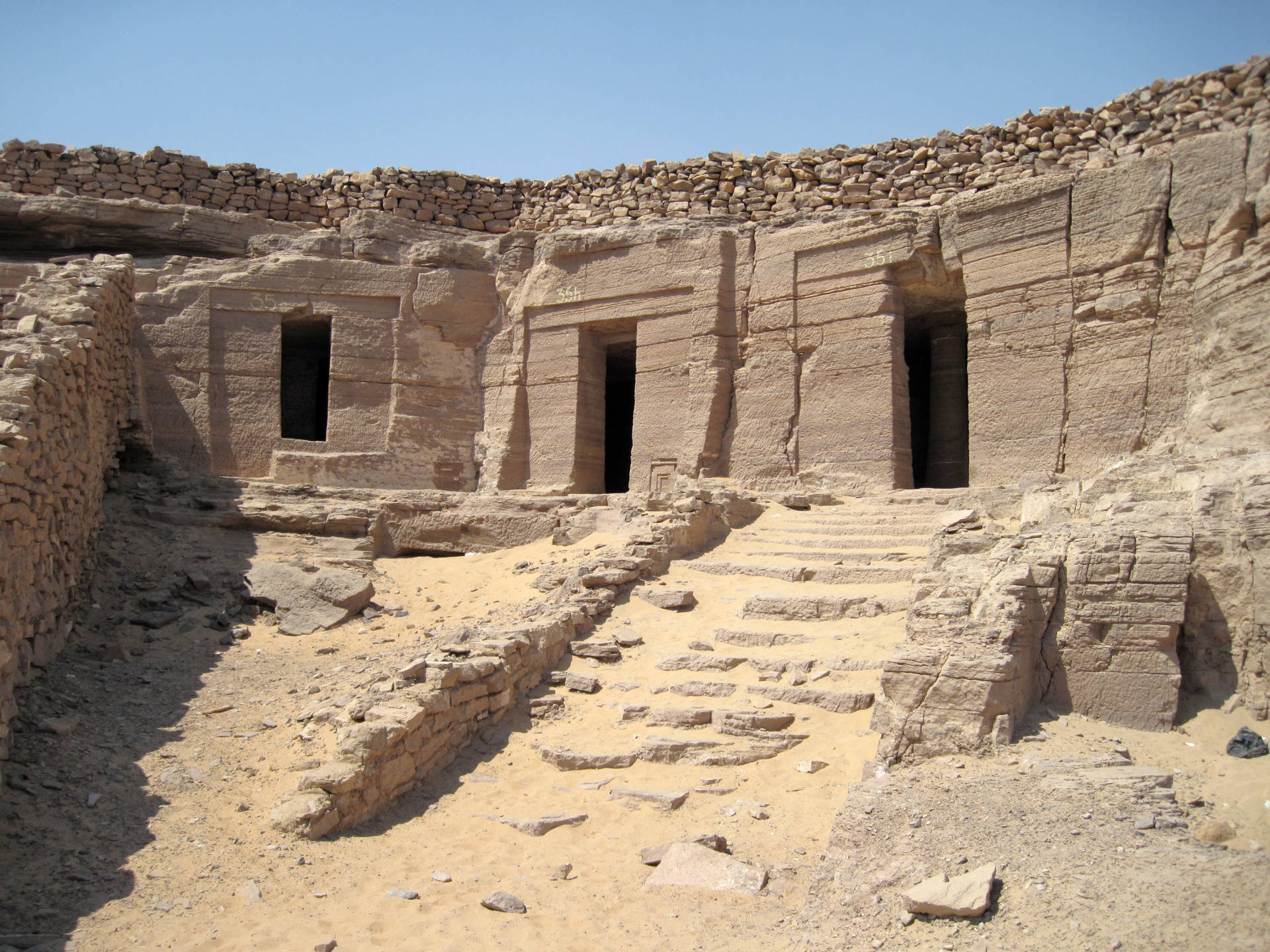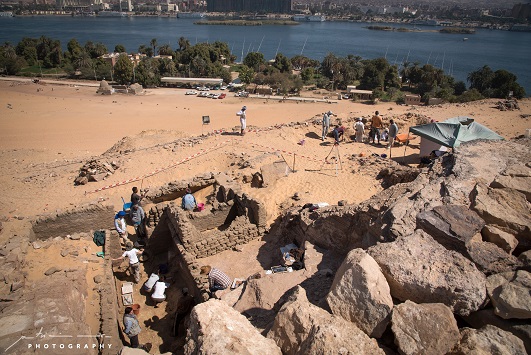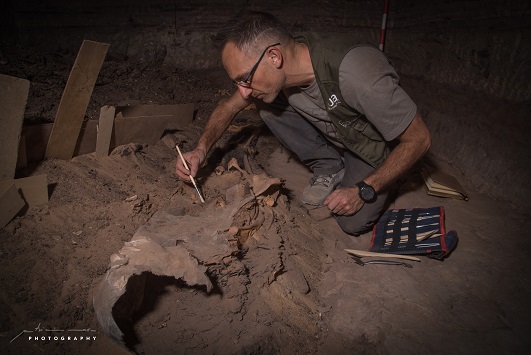
Since 2008 the University of Jaen in cooperation with the Egiptian Ministry of Antiquities is developing an archaeological project in the necropolis of Qubbet el-Hawa. This is generating a very useful information for the reconstruction of the history of Ancient Egypt.
As a result of the experience gained in the latest nine seasons of excavation campaings, the University of Jaen has obteined a large experience which is ofered now as a postgraduate theoretical and practical field school for postgraduate students.

This course is designed as a theoretical-practical field of work that has as main objectives the learning and understanding of the archaeological excavation as well as the research methods used in Egypt.
During the course the students will learn the methodological elements necessary for excavations and research work related to Egyptology, which will be conducted by specialists in their different areas. In addition, the student will be provided with the necessary tools for the application of archaeological methodology, both in theoretical classes and during field work, facing the different situations that arise in the day to day of an excavation.
Students will learn about the history of Ancient Egypt, especially during the Old and Middle Kingdom (2200-1750 BC), dates on which the Qubbet el - Hawa site was used as a necropolis of the provincial elite. The student will be able to recognize in a general way the materials of each historical moment and its technology, as well as its functionality and context.


| PRE-REGISTRATION PERIOD | REGISTRATION PERIOD | TEACHING |
|---|---|---|
| From September 1 to September 30, 2017 | From October 1 to October 31 | Face - to - face classes |
| SART DATE | FINISH DATE | ECTS/HOURS |
|---|---|---|
| December 01, 2017 | April 30, 2018 | 10 ECTS |
Previous experience is helpful but not necessary. Only Postgraduates, graduates, graduates, engineers, architects who have completed their studies. As an essential requirement it will be necessary to be in possession of level B1 of English.
Organization/es collaborator/s: Ministry of Egyptian Antiquities and University of Jan.
Director: Alejandro Jimenez Serrano.
Contact: egiptologia@ujaen.es
Places: 10 (through the University of jaen).
Scholarships: 1 scholarship requested.
Tuition and Fees: 2500€.
Field School Admissions Deadlines: From 1st September until30th September 2017.
Field School Enrolment Deadlines: From 1st October until 30th October.
The team: It is a mix of international students. It is a small group so instructors can have a direct contact with the students and inspectors.
Documents: Curriculum Vitae; Presentation letter; 2 Reference Academic Contacts.
Dates: Classes at the University of Jaen: December 2017. Field work: Four weeks, March-April 2018. (This program is subject to the time of the security permission from the Ministry of Interior).
Schedule: Activities celebrated at the University of Jaen: pending of schedule. Excavation at The necropolis of Qubbet el-Hawa (5 days of excavation at week + 1 day visit to the archaeological sites of the area).
Practical fieldwork skills: Excavation diary and materials record, sample collection, Archaeological digitalization, Photographic documentation. Use of optical level, Archaeological drawings, Technical drawing of materials, Archeobotany, Excavation reports, etc. We have an experienced team of excavators who will instruct participants in the proper ways to excavate and record an archaeological site.
Studying visits in Egypt: Aswan Nubian Museum, Elephantine Museum, Elephantine (Urban Archaeology), Qubbet el‐Hawa (Ancient Egyptian Funerary Archaeology & Medieval Archaeology), Gebel el‐Silsila (Mining Archaeology and Epigraphy), Abu Simbel (New Kingdom Royal Architecture), Kalabsha Temple (New Kingdom and Graeco-Roman Religious Architecture), Edfu Temple (GraecoRoman Religious Architecture), Temple of KomOmbo (GraecoRoman Religious Architecture), Temple of Philae (GraecoRoman and Medieval Religious Architecture) and Saint Simeon (Medieval Archaeology).
Not included: Housing/accommodations, meals (food) and transport and travel within Spain. Participants are responsible for arranging their insurance in Spain, their own travel to Jaen and their own accommodation there during the activities celebrated at the University of Jaen.
Included: Teaching and practices, working material, plane ticket from Europe to Egypt, insurance in Egypt, visits to some archaeological sites in the province of Aswan, meals and accommodation in Aswan (Egypt).
Organization/es collaborator/s: Ministry of Egyptian Antiquities and University of Jaén.
Director: Alejandro Jiménez Serrano.
Contact: egiptologia@ujaen.es
Places: 10.
Scholarships: 0.
Tuition and Fees: 0€.
Field School Admissions Deadlines: From 1st September until30th September 2017.
Field School Enrolment Deadlines: From 1st October until 30th October.
The team: It is a mix of international students. It is a small group so instructors can have a direct contact with the students and inspectors.
Participants and admissions requirements: Previous experience is helpful but not necessary. Only MOA Inspectors can apply. As an essential requirement it will be necessary to be in possession of level B1 of English.
Dates: Four weeks, March-April 2018. (This program is subject to the time of the security permission from the Ministry of Interior).
Schedule: Excavation at The necropolis of Qubbet el-Hawa (5 days of excavation at week + 1 day visit to the archaeological sites of the area).
Practical fieldwork skills: Excavation diary and materials record, sample collection, Archaeological digitalization, Photographic documentation. Use of optical level, Archaeological drawings, Technical drawing of materials, Archeobotany, Excavation reports, etc. We have an experienced team of excavators who will instruct participants in the proper ways to excavate and record an archaeological site.
Studying visits in Egypt: Aswan Nubian Museum, Elephantine Museum, Elephantine (Urban Archaeology), Qubbet el-Hawa (Ancient Egyptian Funerary Archaeology & Medieval Archaeology), Gebel el‐Silsila (Mining Archaeology and Epigraphy), Abu Simbel (New Kingdom Royal Architecture), Kalabsha Temple (New Kingdom and Graeco-RomanReligious Architecture), EdfuTemple (GraecoRoman Religious Architecture), Temple of KomOmbo (GraecoRoman Religious Architecture), Temple of Philae (GraecoRoman and Medieval Religious Architecture) and Saint Simeon (Medieval Archaeology).
Not included: Housing/accommodations, meals (food) and transport and travel within Egypt. Participants are responsible for arranging their own national travel to Aswan and their own accommodation, and transport to the site every workday.